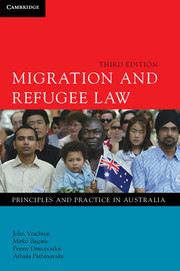Book contents
- Frontmatter
- Contents
- Table of cases
- Table of statutes
- Preface to the third edition
- Acknowledgments
- 1 Historical context to migration
- 2 Immigration control: An overview
- 3 Basic migration legislation and policy
- 4 The visa system and application procedures
- 5 Family and interdependency migration and other Australia-based visas
- 6 Business and investment visas
- 7 Skills-based visas
- 8 Temporary visas
- 9 Miscellaneous visas
- 10 Common visa requirements
- 11 Compliance: Unlawful non-citizens, removal and deportation
- 12 History of the Refugees Convention and definitional framework
- 13 Refugee and humanitarian visas: The statutory structure
- 14 Convention grounds
- 15 Persecution
- 16 Well-founded fear of persecution
- 17 Limits on protection of refugees – cessation, exclusion exceptions and protection by another country
- 18 Time for a fundamental rethink: Need as the criterion for assistance
- 19 The determination and review process for migration and refugee decisions
- Index
- References
17 - Limits on protection of refugees – cessation, exclusion exceptions and protection by another country
Published online by Cambridge University Press: 05 June 2012
- Frontmatter
- Contents
- Table of cases
- Table of statutes
- Preface to the third edition
- Acknowledgments
- 1 Historical context to migration
- 2 Immigration control: An overview
- 3 Basic migration legislation and policy
- 4 The visa system and application procedures
- 5 Family and interdependency migration and other Australia-based visas
- 6 Business and investment visas
- 7 Skills-based visas
- 8 Temporary visas
- 9 Miscellaneous visas
- 10 Common visa requirements
- 11 Compliance: Unlawful non-citizens, removal and deportation
- 12 History of the Refugees Convention and definitional framework
- 13 Refugee and humanitarian visas: The statutory structure
- 14 Convention grounds
- 15 Persecution
- 16 Well-founded fear of persecution
- 17 Limits on protection of refugees – cessation, exclusion exceptions and protection by another country
- 18 Time for a fundamental rethink: Need as the criterion for assistance
- 19 The determination and review process for migration and refugee decisions
- Index
- References
Summary
Overview of exclusion, cessation and exceptions
The Refugees Convention sets out a number of circumstances where the protection obligations by states towards refugees are limited or expunged. The duty of states to protect refugees is limited in seven broad circumstances. These are set out in:
Article 1C – which defines several circumstances where refugee status ceases to exist;
Article 1D – which excludes from the Convention persons who receive protection from certain UN organs;
Article 1E – which excludes persons who can obtain access to a third country;
Article 1F – which excludes individuals who have committed specified criminal acts;
Article 32 – which permits expulsion of a refugee where the refugee is a security danger;
Article 33(2) – which permits expulsion where there are grounds to believe that the refugee has been convicted of a ‘particularly serious crime’; and
in addition to this, a person is not entitled to protection in Australia where he or she can receive protection in a third country.
The overarching rationale for the exceptions is that either the protection obligations to refugees only arise as a matter of last resort or a State's security interests trumps its obligations to needy foreigners.
Article 1C applies where refugee status has already been conferred and sets out the circumstances in which refugee status can be lost: that is, where refugee status ceases. The exclusions contained in Articles 1D to 1F relate to situations where a person has not yet been granted refugee status. Articles 32 and 33(2) are properly categorised as exceptions, in that they apply where refugee status has been conferred and operate to expunge a state's protection obligations on the basis of national interest. Where a person is eligible to receive protection in a third country, this is properly classified as an exclusion, since it justifies a state not conferring refugee status.
- Type
- Chapter
- Information
- Migration and Refugee LawPrinciples and Practice in Australia, pp. 270 - 302Publisher: Cambridge University PressPrint publication year: 2011



